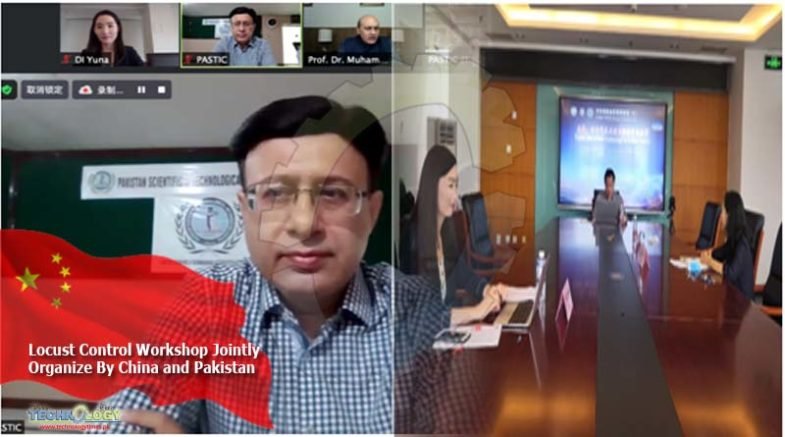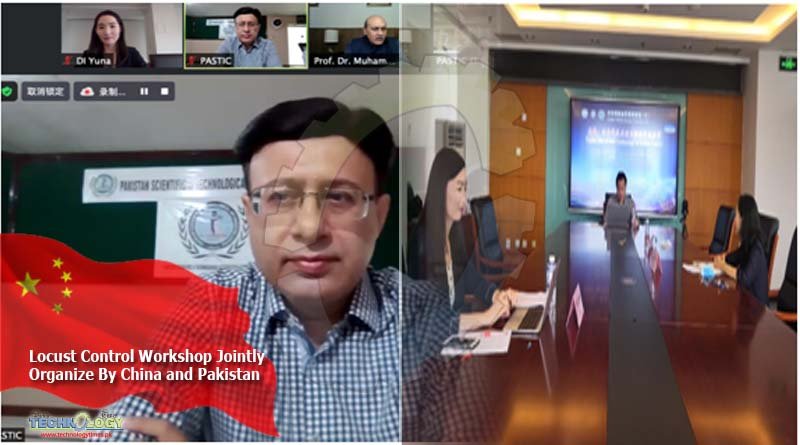China and Pakistan jointly organized online workshop on “use new technology in locust control Workshop”. The workshop was organized by Beijing Technology and Business University (BTBU), Pakistan Science Foundation and Pakistan Scientific & Technological Information Center (PASTIC).

It was supported by China Association for Science & Technology (CAST), Pakistan Ministry of Science & Technology (MoST), Embassy of the People’s Republic of China in the Islamic Republic of Pakistan, and Embassy of the Islamic Republic of Pakistan Beijing, and was co-organized by China Centre for International Science and Technology Exchange (CISTE) and Beijing Association for Science & Technology (BAST). More than 100 scientific and technical personnel from Pakistan participated in this session.
Prof. Zheng Wenhong, Vice President of BTBU, Prof. Muhammad Akram Shaikh, Director General of PASTIC, Prof. Muhammad Ashraf, Vice Chancellor of University of Agriculture Faisalabad, and Gu Wenliang, Agricultural Commissioner of Embassy of the People’s Republic of China in the Islamic Republic of Pakistan, delivered speeches successively. Vice President Zheng Wenhong expressed gratitude to all the experts and scholars for attending this training.
The first workshop in 23/July had received active participation and extensive attention from Pakistan. For this session, BTBU invited two well-known domestic experts in locust disaster management for lectures. We are confident that more scientific and technological personnel will be able to master the technology of fighting locusts, and it will also promote more extensive cooperation between China and Pakistan.
President Zheng especially thanked Vice Chancellor Muhammad Ashraf for attending this training and looked forward to in-depth cooperation between the two universities in the agricultural field in the future to jointly promote the construction of the China-Pakistan Economic Corridor.
Prof. Muhammad Akram Shaikh, delivering remarks on behalf of MoST, pointed out that the Pakistani government has adopted various measures to fight against this locust disaster, in the process of which and the Chinese government has given Pakistan a lot of assistance. He also expressed his thanks for the cooperation and efforts of all the organizers to jointly prepare for this training. Finally, he said he was confident that their R&D personnel and technicians would definitely get relevant technical support in locust control through this workshop.
Vice Chancellor Muhammad Ashraf said in his speech that today’s theme was very important as it focused on advanced technologies to control locust disasters. The outbreak of the desert locust disaster in Pakistan has severely affected Pakistan’s agricultural production and food security. Pakistan needs new technologies and new innovations in locust management.
China leads the world in locust disaster prevention and control technology. It is hoped that Pakistan can learn from China’s advanced Eco-friendly locust prevention and control technology to help Pakistan cope with the locust disaster, and look forward to continuing cooperation in the field of new technologies to combat locusts in the future.
Dr. Gu Wenliang introduced the active cooperation and efforts of China and Pakistan in fighting the locust disaster. At the beginning of 2020, the relevant Chinese authorities formulated a work plan for assisting the prevention and control of the locust disaster in Pakistan, dispatched a locust disaster prevention and control work group to conduct field investigations, provided technical plans, and donated a large number of materials, pesticides, and machinery and equipment.
China and Pakistan have carried out continuous cooperation in the field of fighting locusts. He is confident that today’s training can further promote the cooperation between China and Pakistan in the field of fighting locusts and jointly promote sustainable economic and social development.
As for the training lectures, Dr. Huang Wenjiang, from Aerospace Information Research Institute of Chinese Academy of Sciences(AIR-CAS), introduced in detail their team’s methods and achievements in monitoring and evaluating locust disasters using remote sensing technology. Tu Xiongbing, from Research Office of Weed, Rodent and Grassland Plant Protection, Institute of Plant Protection, Chinese Academy of Agricultural Sciences, introduced the main characteristics and feasible management methods of Pakistani desert locusts.
The Q&A session was moderated by PASTIC. The participants from Pakistan expressed thanks to the two professors for their wonderful lectures and conducted active discussion about the content of the lectures.
This training session meets the needs of Pakistan’s current social development and has received great attention from both China and Pakistan, while its attention, participation and influence have been significantly improved. The training provided intellectual support for Pakistan to deal with the locust disaster, provided an exchange platform for China-Pakistan agricultural cooperation, and promoted China-Pakistan science and technology exchanges.
